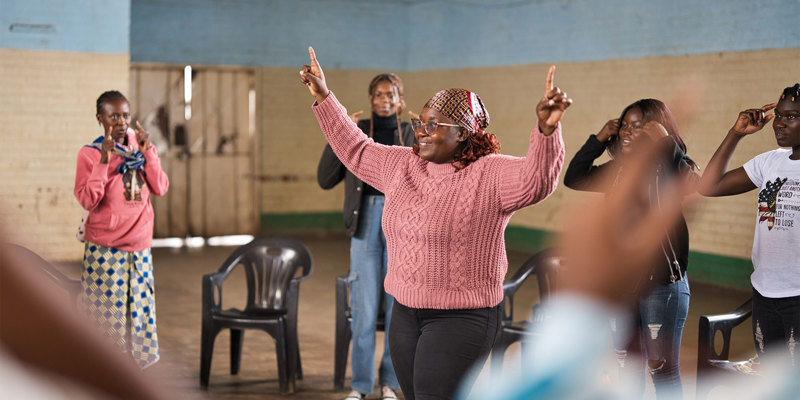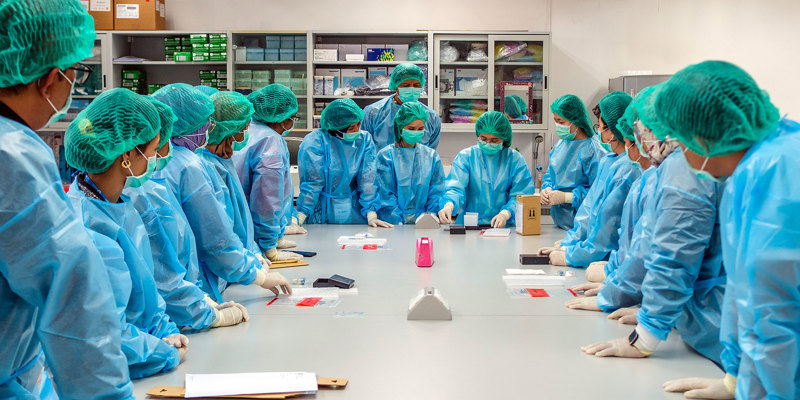Mozambique and Global Fund Launch New Grants to Accelerate Progress Against HIV, TB and Malaria and Strengthen Health Systems
11 April 2024
download in Português
MAPUTO – The Global Fund to Fight AIDS, Tuberculosis and Malaria (the Global Fund), the Republic of Mozambique and health partners launched yesterday the implementation of seven new grants worth nearly US$771 million, a 3% increase from the previous allocation period. With these new grants, Mozambique becomes the Global Fund's second largest investment portfolio in the new grant cycle.
The new grants will sustain progress against AIDS, tuberculosis (TB), and malaria while strengthening health and community systems across the country over the 2024-2026 period. Over the longer term, these grants will contribute to achieving universal health coverage and reaching the 2030 targets for Sustainable Development Goal 3 on health and well-being for all.
The Ministry of Health and civil society partners – Fundação para Desenvolvimento da Comunidade (FDC), Centro de Colaboração em Saúde (CCS) and World Vision International – will implement the grants with the support and engagement of the communities most affected by the three diseases.
With technical support from the World Health Organization (WHO) and UNAIDS and in alignment with PEPFAR investments, the two HIV grants will seek to increase antiretroviral therapy coverage among all people living with HIV to 81% by 2025 and further support the implementation of differentiated treatment and care delivery to those in need. The grants will also promote new HIV prevention and testing approaches for key populations, including people in prison, people using drugs and transgender people. These efforts will be complemented by an increased investment in addressing human rights and gender-related barriers in HIV and TB services. The overall goal is, by 2025, to reduce new HIV infections by 25% and HIV-related deaths by 30%.
The TB grant will aim to support the national TB program to increase the notification rate of all forms of TB; to increase the proportion of TB cases confirmed with a bacteriological test; to improve the treatment success rate of drug and/or multidrug-resistant TB from 75% in 2021 to 90% in 2026 and to sustain the treatment success rate of all forms of TB at 90% or above. An additional HIV/TB grant will seek to better integrate TB and HIV treatment and prevention and increase multidrug-resistant TB services by linking them to the broader work to find missing people with TB.
For malaria, two grants will continue to support the implementation of the national malaria control strategy, which is focused on providing universal access to quality malaria diagnosis and treatment and at least one method of vector control (long-lasting insecticidal nets or indoor residual spraying) to all populations at risk. The grants also provide support for expanded chemoprevention activities and critical community interventions. Together with other technical partners and donors, such as WHO and the U.S. President’s Malaria Initiative, the Global Fund grants support Mozambique’s fight against the growing incidence of malaria in the northern part of the country.
A new, stand-alone grant dedicated to building resilient and sustainable systems for health complements investments in the disease programs and highlights Mozambique’s commitment to ensuring that systems for health across the country can respond to emerging health crises, including those driven by climate change.
The new grants were launched during a ceremony presided over by Prof. Dr. Armindo Tiago, Minister of Health, with interventions from civil society representatives, Canada and U.S. Government and Global Fund representative. Also in attendance were members of the Country Coordinating Mechanism, representatives from UN agencies and health partners.
Prof. Dr. Armindo Tiago, Minister of Health of the Republic of Mozambique, said: “Today, we are not only recognizing and celebrating the massive efforts that have brought Mozambique this far in the fight against the three diseases, but, in partnership, we are also setting in motion the important work that lies ahead. We will continue to work closely with our partners to improve the health of Mozambicans and to achieve the ambitious goals set out in these new grants.”
Mark Edington, Head of the Grant Management Division at the Global Fund, said: “We are grateful to the government of Mozambique for its strong leadership and to our donors and partners for their continued commitment and support to our mission. Our shared achievements have made important strides in the health and well-being of the Mozambican people as well as major contributions to the fight against the three diseases. We will continue our joint efforts with an increased focus on equity, human rights, gender and pandemic preparedness and response to protect the health gains made over the last two decades.”
The new grants come on top of US$91.8 million in funds from the COVID-19 Response Mechanism (C19RM), which focus on supporting health systems strengthening and pandemic preparedness in the country in 2024-2025. These investments have helped mitigate the impact of the pandemic on HIV, TB and malaria services and outcomes and strengthened key parts of the health system, including surveillance, diagnostics, and oxygen facilities. Mozambique was also awarded US$18.8 million in catalytic funding to strengthen its health programs to support adolescent girls and young women, distribute pre-exposure prophylaxis (PrEP), increase TB case finding, build resilient and sustainable systems for health and bolster its work on human rights and gender.
Over the last decade, Mozambique has made remarkable progress in its fight against HIV, TB and malaria. Since 2013, the government, the Global Fund and global and local health partners have worked together to implement a rapid expansion of HIV treatment, increasing the number of people on antiretroviral therapy from 300,000 in 2012 to over 2.1 million in 2023. This has led to a significant reduction in the number of AIDS-related deaths in the country – from a peak of 71,756 deaths in 2006 to approximately 42,000 in 2023. In 2022 alone, 109,964 people were treated for TB and, and between 2021 and 2023, the country received over 22 million insecticide-treated mosquito nets.
To date, the Global Fund has signed over US$3 billion in investments in Mozambique.







